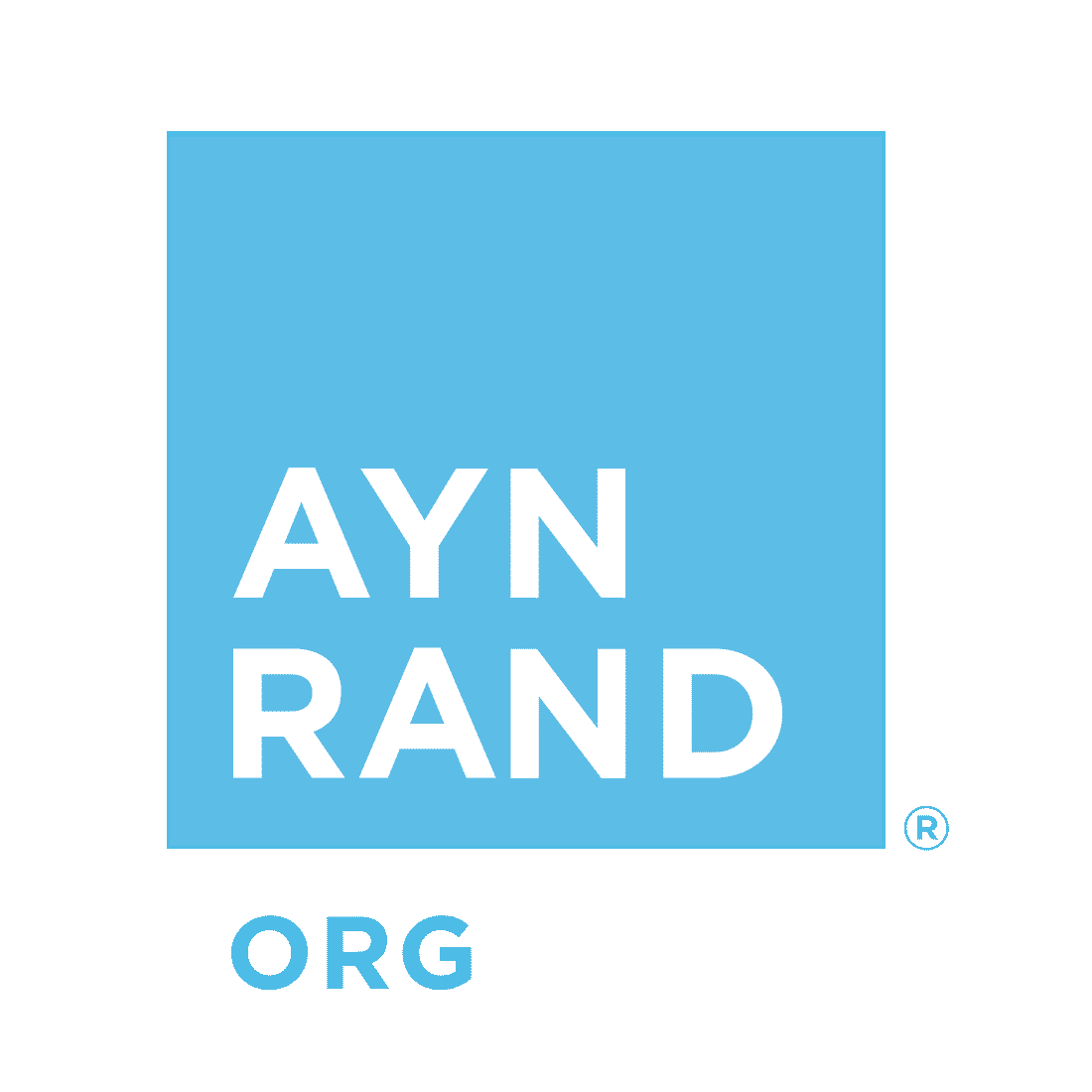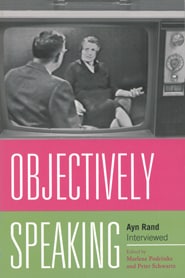

After Atlas Shrugged was published in 1957, Rand turned to nonfiction writing and was much in demand for public lectures and radio and television interviews.
These edited transcripts of interviews, mostly from the late 1950s through the early 1980s, afford an opportunity to see Rand’s mind at work in the moment, responding to complex questions on politics, art, education and ethics from famous interviewers — Johnny Carson, Phil Donahue, Mike Wallace, Edwin Newman and Louis Rukeyser among them — as well as anonymous Columbia University students and other hosts.
Coedited by Marlene Podritske and Peter Schwartz, the book contains over thirty interviews. In the preface, coeditor Podritske cautions us, however, that “these interviews are not necessarily Ayn Rand’s final, considered arguments on any point; they are not meant to stand as her official statements and they have been edited without her oversight.”
— Marlene Podritske, coeditor, “Preface,” Objectively Speaking: Ayn Rand Interviewed
The first half of this book is devoted to interviews broadcast on Columbia University’s campus radio station and is organized topically. There are focused discussions on Objectivism vs. “Conservatism,” the campaign against “extremism,” the “robber barons” and other myths of capitalism, the political structure of a free society, the U.S. Constitution, objective law, education, Romantic literature, Romanticism vs. Naturalism in art, the visual arts, Rostand’s drama Cyrano de Bergerac, Rand’s favorites in art, the nature of humor, foundations of morality, altruism, individual rights and the Objectivist ethics.
The second half of the book contains more wide-ranging interviews, organized chronologically — from the Mike Wallace Interview in 1959 to Louis Rukeyser’s Business Journal in 1981 (a year before Rand’s death). In these interviews, Rand covers too many topics to list, including her views on love, sacrifice, America’s future, the power of ideas, private schools, America’s intellectuals, ancient philosophers, science, selfishness, productive work, family, military conscription, war, Vietnam, atheism, faith, the United Nations, monopolies, charity, envy, Immanuel Kant, modern art, ecology, pollution, capitalism, Women’s Liberation and drug legalization.
Mike Wallace: [I]n your book you talk about love as if it were a business deal of some kind. Isn’t the essence of love that it is above self-interest?
Ayn Rand: Let me make it concrete. What would it mean to have love above self-interest? It would mean that a husband, if he accepted the conventional morality, would tell his wife: “I am marrying you just for your own sake. I have no personal interest in you, but I am so unselfish that I am marrying you only for your own good.” Would any woman like that? . . .
[Love] should not be treated like a business deal, but every arrangement has to have its own terms and its own kind of currency. And in love the currency is virtue. You love people not for what you do for them or what they do for you; you love them for their values and their virtues, which they have achieved in their own character. You don’t love causelessly. You don’t love everybody indiscriminately. You love only those who deserve it.
These interviews are a rich source of commentary, available nowhere else, on the practical implications of Objectivism’s political and legal principles. Ayn Rand discusses such topics as government’s form (democracy vs. constitutional republic), federalism, separation of powers, the role of geography in representation, filibuster, standards for selecting Supreme Court justices, freedom of the press, the military draft, environmental laws and antitrust law.
In the interviews, Rand also discusses such topics as the purpose of law in a free society, the characteristics of objective and non-objective law, flaws in the U.S. Constitution (including slavery, eminent domain and the Commerce Clause), judicial discretion, legal competency, ignorance of the law, preventive law, rules of evidence and a constitution’s fate in an era of philosophical decline. There are fascinating asides on Roman law, how businessmen can fight bad laws and why she regards Justice Oliver Wendell Holmes, Jr. as the “worst philosophical influence on American law.”
As an advocate of laissez-faire capitalism, Ayn Rand was constantly asked to address common objections to a system that includes complete economic freedom. In these interviews, Rand refutes the historical account of great industrialists as “robber barons” (“The so-called robber-barons created the wealth they are accused of having stolen”), explains why monopolies are not a threat on a free market (“Any large company, or combination of companies, can be destroyed in a free market by any competent newcomer”), and discusses the cause of business cycles (“government manipulation of money and credit”).
Laissez-faire, Rand observes, is universally scapegoated: “Whenever anything goes wrong in some industry, it is capitalism that is blamed. Yet if you investigate, you will find without exception that the source of the evils is government intervention, not free enterprise.”
Ayn Rand was frequently asked to explain her moral opposition to altruism, which is widely associated with benevolence toward others. Most people “believe that if you give a dime to a beggar, you are an altruist,” Rand observes. “Nothing could be further from the truth. Altruism does not claim that you should help others when and if you can. It claims that you should subordinate your own interests to the interest of others and that others should take first place in your life as a moral duty.”
In these conversations, Rand discusses altruism’s origins, definition, contradictions and negative impact on self-esteem, motivation and career pursuit. She also touches on ideas that obscure altruism’s influence (such as psychological egoism, the idea that everybody is selfish), the relationship between altruism and the 1960s drug culture and the question of risking one’s life in wartime.
Ayn Rand was a tireless champion of art’s life-serving value. In these interviews, Rand speaks not only of her own approach to writing (“The role of a fiction writer is to present things, not as they are, but as they might and ought to be”) but also of particular works’ merits (Tolstoy’s Anna Karenina, a “great work of art” that is also “the most evil novel in world literature, at least among the majors works that I have read”) and of her personal responses to art (“My favorite painting is Dali’s The Crucifixion”).
Among topics addressed are: Romanticism and Naturalism as differing in their treatment of man’s free will — the character of Javert in Hugo’s Les Misérables — the meaning of “escapism” — objective standards for evaluating art — film as a “composite art, made up of an integration of other arts” — and an entire interview devoted to Rostand’s Cyrano de Bergerac, “the greatest play in the history of Romantic literature.”
This book contains Ayn Rand’s most extended public discussion of humor, beginning with the facts of reality that give rise to man’s need of humor, and including her distinction between moral and immoral types. “The worst type of humor, psychologically and morally,” Rand observes, “is the type that hides malevolent, antagonistic statements — ones that a man does not have the courage to convey openly — under a laugh.”
Along the way, Rand discusses puns, slapstick, satire, stand-up comedy, theater of the absurd, sick jokes, “Romantic humor” and intelligent humor. She also talks about particular humorists — including Charlie Chaplin, Oscar Wilde, Noel Coward and the director Ernst Lubitsch — and notes that she can’t stand Jerry Lewis or “any comedian whose style consists in making man look ridiculous, in appearing grotesque or in satirizing the essence of man.”